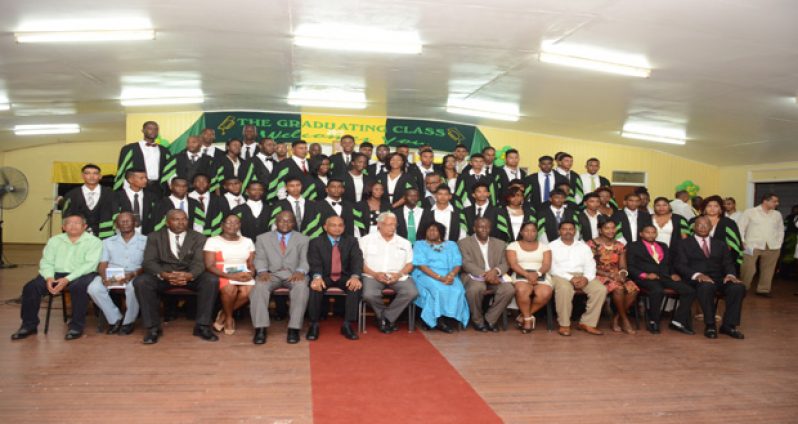PLUGGING need for youth involvement in the agricultural sector, Minister of Agriculture Noel Holder declared that emphasis must be placed on facilitating market opportunities through motivation, improving the imagery of agriculture and access to training.Addressing the 51st graduation exercise for 138 young professionals at the Guyana School of Agriculture (GSA) last Friday, who became marketable within the sector, the Minister said the depletion of youths within the sector is a growing concern, not just in Guyana but all across the world.
The Agriculture Ministry, Holder declared, “intends tackling this growing concern through the Agricultural Developmental Agenda by engaging youths in agriculture, as many of them have become less interested in this sector.”
Receiving gold medals for the best overall performance at the GSA Mon Repos and Essequibo campuses were Paul Harris and Sherifa Valenzuela respectively.

Prizes were distributed by newly- appointed Regional Chairperson, Region Four, Genevieve Allen, while the audience was entertained by the Guyana Police Force Band.
There has been a decline in the rural population, according to a report by the United Nations (UN) and the World Health Organisation (WHO), and by 2030 6 out of 10 people will live in cities, but this will increase to 7 out of 10 by 2050, meaning that more young people are moving to towns and cities to find work, while leaving few behind to work in rural areas.
Making reference to this, Minister Holder stated that it is easy to understand why the number of young farmers is in decline, but “we have to increase youth involvement by improved and easier access to resources, by facilitating market opportunities through motivation and by improving the imagery of agriculture and improved access to training and capacity development… Improvements in the available human capital will determine the pace of growth of the agricultural society.”
GSA’s role
Lauding the GSA for its good work, the Agriculture Minister said that the institution is seeking to train and promote capacity-building through its curriculum; farmer and enterprise development training, and particularly value-added activities such as food processing and packaging.
Therefore, focus should be placed on the transformation of the institution, given the fact that the GSA is aiming to produce trained professionals to support the development of the sector by helping to create employment and guarantee Guyana’s food security.
The GSA has over the years produced a cadre of trained professionals to support the development of the agricultural sector, helping to guarantee Guyana’s food security.
The enrollment of the school has grown in 2014, reaching a total of 120 students as compared to an average of 31 in the first decade of the school’s establishment, and now it has a total of 164 new students for the 2014-2015 academic year.
The graduates will further enhance the farming, animal health, veterinary public health, forestry, fisheries and agro-processing sectors of Guyana’s total agriculture industry.
“Collaboration with the Ministry of Education to achieve improved training at the primary and secondary school levels and linking schools’ agricultural operations to the general curriculum, and continuous reviews of the curriculum to keep teachers in sync with the changing demands and challenges of the sector will be vital,” said Minister Holder.
This will enhance the national outlook, with emphasis on a sustainable low carbon trajectory and the food security needs of the Caribbean region.
Hinterland development
Moreover, the Minster said there is a need to rapidly commence shifting the nation’s major economic activities away from the rather congested coastal strip, which accommodates more than 80 % of Guyana’s population.
It should be noted that while agriculture is primarily concentrated on the coast, the potential for agricultural development in the hinterland regions is significant.
Government’s 2015 manifesto has benchmarked development of the hinterland as a priority, with the implementation of policies for development of the Intermediate Savannahs, as well as the Rupununi savannahs.
“The Intermediate Savannahs have long been considered as the next frontier for agricultural development and several studies conducted by a number of competent agricultural and related professionals have indicated the vast untapped potential within the region, with corresponding challenges,” Minister Noel noted.
Meanwhile, in delivering the charge to the new graduates, Chairman of the GSA Board of Directors and Chief Education Officer, Olato Sam, urged that they be good ambassadors of the institution.
The Chairman encouraged the graduates to put into practice what was taught to them in the various fields, so that they can contribute to the further advancements of the sector. “The prospects for a bright and prosperous future have never been brighter…having completed your respective courses, you are now equipped with the specialized skill sets and knowledge base in your respective technical areas of pursuit and I feel you are ideally poised to reap the benefits of this new era we are stepping into,” he said.
By Navendra Seoraj



.jpg)








